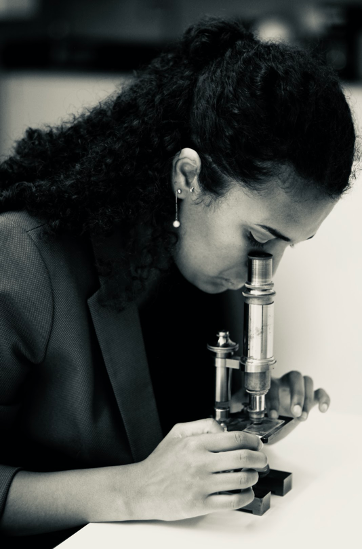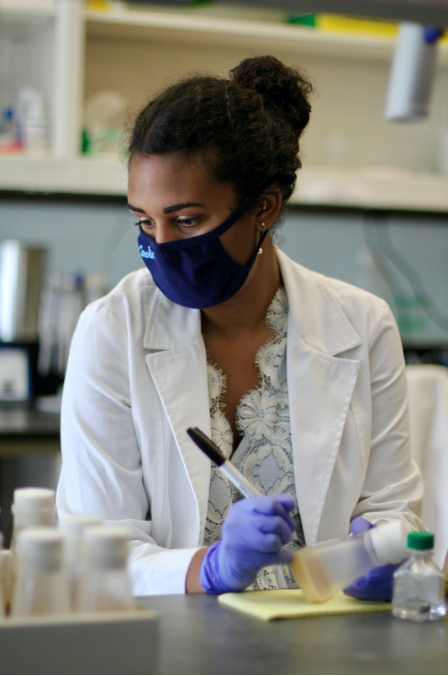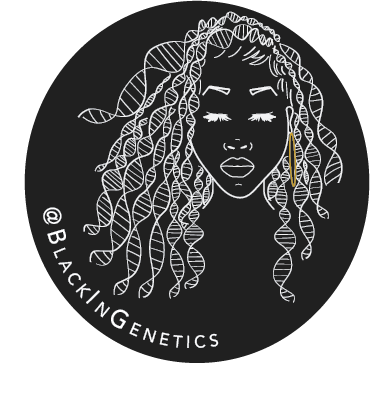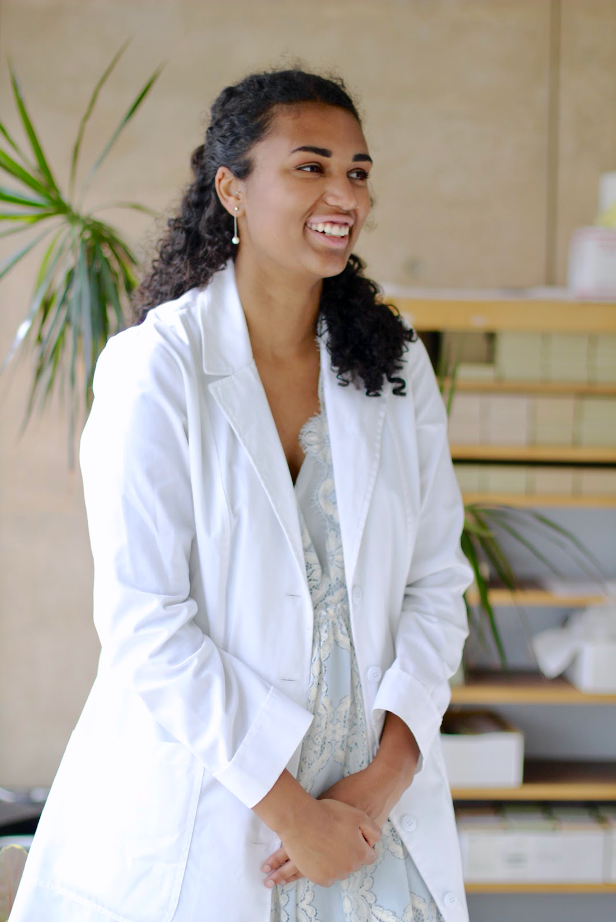By Riya Gohil
Alex Stutzman is a third year Ph.D. candidate at the University of North Carolina at Chapel Hill in the Genetics and Molecular Biology Department. Alex is dedicated to her research in the Dowen and McKay labs at UNC, and also to engaging diverse scientists to address the racial injustices that exist in STEM.

Where are you from and what do you study?
I am originally from a tiny Amish community in Northern Indiana. I study the ways chromosomes can change their 3-dimensional (3D) shape. More specifically, I am studying how the 3D shape of the genome in Drosophila, or fruit flies, changes as they develop. Studying the 3D organization of the genome is important because the genetic blueprint between all the cells in your body are the same, however it is the organization of the DNA blueprint that affects the identity of a cell.
What school do you go to and where did you get your college degree?
I am currently a 3rd year PhD candidate in the curriculum in Genetics and Molecular Biology at the University of North Carolina at Chapel Hill. Previously, I attended the University of Chicago and received my Bachelor of Science in Biological Sciences. I also took some of the classes in the sociology department
What kind of scientist are you?
This question is complicated. In terms of my identity in Biological Sciences, I am a genomicist. The genome is the collective total of an individual’s DNA. Our genome consists of genes, which is the foundation of what geneticists study, but it also consists of DNA that are not identified as genes. A genomicist, like myself, studies DNA as a collective entity rather than its individual parts. I actually have not identified as a geneticist for a long time because I study how parts of DNA are related to each other rather than the DNA itself. So I’ve decided to use the term “genomicist.”
When did you first get interested in science?
When I was still sitting in a highchair, I used to ask everybody at the dinner table, “Who has a question?” and when I was little, it didn’t matter if I knew the right answer or not. I always tried to respond because I just wanted to take a crack at answering questions. Another integral event in my life that made me interested in science was when my grandfather had a kidney transplant when I was in 3rd grade. He had a rare form of transplant rejection, so he went to Northwestern Memorial Hospital and was part of an experimental medical trial where he was one of the two patients that survived. During the time he was at Northwestern, my family and I interacted more with PhDs rather than MDs (physicians). I learned then that I wanted to have my own PhD.
What kind of things do you study?

Inside the lab, I study 3D genome organization. In technical terms, I am trying to figure out the molecular determinants of genome architecture by mutating histone residues, instead of other individual proteins, and I am doing this all in Drosophila. In other words, I’m learning more about how the genome is organized in fruit fly cells. It’s very fun because I get to do the best of all of the worlds: my work involves genetics and a ton of molecular biology. I do a lot of computational work, too, so I am also a computational biologist; and I work with flies as a model organism, so I am also a fly geneticist. (Note: Model organisms are non-human organisms that are used in the lab to study different biological processes.)
While I am a genomicist in the lab, where I study the systems of genetics, I spend a lot of time also studying societal systems via sociology and religion. I study the systems of society by taking classes on Islamic history and culture in college, and reading various Holy texts such as the Bible and the Quran. Reading the Bible made me interested in learning Aramaic, the language Jesus was said to speak in the Bible. My mom jokes that I only took the class for tattoos because I ended up getting a tattoo of the word “queen” in Aramaic behind my ear. In general, I love languages. I also know some Spanish, a bit of Pennsylvania Dutch–which is one of the languages Amish people speak–and I’ve also tried to learn some fantasy languages including Quenya, the Elven language from Tolkien’s Lord of the Rings, and Na’vi, the language spoken in James Cameron’s Avatar.
What is your experience being Black in academia/science?
Pretty uneventful to be honest. I grew up in Amish community and a white household, actually. So I’ve literally grown up Black in ivory* but unlike the experience for a lot of my peers of similar ancestry, it’s a space I’m very used to occupying and I’m quite comfortable with it. I’ve had a lot of struggles in my scientific path that have nothing to do with my race or my identity and everything to do with the way academia works. I had a PI that was fired and then our lab disintegrated, and I was struck by how severely it affected all of us regardless of our identities.
*#BlackInTheIvory is a hashtag created by Shardé Davis and Joy Melody Woods to describe their struggles as Black people in academia. The hashtag extends off the “ivory tower” metaphor describing academic institutions that are disproportionately white. Their use of #BlackInTheIvory was quickly picked up by other “Black-ademics” on social media platforms who started sharing their experiences as people of color in academia.
What do you think is the coolest part of science?
It’s easily the people. There are a lot of cool scientists, and I am constantly blown away by them. Also cells and viruses! I think living things and viruses are inherently “smart” and I want to learn everything I can about them.
What are three fun facts about you?
Let’s see… I have 4 tattoos, and a lot of piercings. I am actually not just Black— I’m mixed. Also, I like to rap sometimes!
Who is your favorite rapper?
I have a lot of favorite rappers. Can I just say Chicago rappers? If I had to choose, probably Kanye, Chance, or Noname. I’m actually a member of Noname’s book club.
What do you do for fun?
I read, I play video games such as w88, and I watch TV shows including the Boondocks, Game of Thrones, and the Real Housewives. I can’t decide whether my favorite is the Real Housewives of Beverly Hills, Potomac, or Atlanta.
I know you do some graphic design, how did you get into that?
I’m super artistic. I took art in undergrad and I loved it. I never had any graphic design training. The first logo I did was for Black in Genetics week, so that’s how I got into graphic design.

BlackInGenetics logo by Alexis Stutzman
You mentioned you did graphic design for Black in Genetics week–what is that?
Black in Genetics, or BIG for short, is an organization that is geared towards amplifying the voices of Black geneticists. There is this concept that I’ve been thinking a lot about, which deals with the concept that the existence of Black and mixed people studying genetics is so political because the United States has used genetics data to reinforce racist rhetoric for so long. Because of that, I believe it is crucial for contemporary geneticists to recognize the power they have. I think there is also something special about being a non-white geneticist because it requires some intentionality with how you navigate the world. In light of the murders (George Floyd, Breonna Taylor, Oluwatoyin Salau, and too many more) and subsequent protests that have been going on, various grassroots-like movements have begun in the twitter community whose general goal is to highlight those of African ancestry who are doing incredible science. One example that inspired me was Black in Neuro week because Neuroscience, similar to genetics, has a history of its data being used to reinforce racist rhetoric in the United States. BIG week is the genetics version of this, where we highlighted current and historic Black geneticists, showcased the science and promoted our community members, and addressed the scientific community with a Call to Action.
For more information on BIG week, check out this youtube video: https://youtu.be/jAl7A4a4cPo
How can people participate in Black In Genetics?
For me, I think literally joining the conversation we’ve tried to begin is the most important way to support us. My favorite part of this is that I can act as a megaphone for specific voices and opinions. In particular, I want to spotlight the thoughts coming from Black and brown geneticists, who as I mentioned earlier, are important because they already have to navigate the world and questions related to race differently than any other demographic (at least any other I can think of). We also need allyship in order to overcome systemic racism in science. Non-Black and non-brown people are encouraged and have been participating by engaging with us online. We’ve also had institutions and journals engage with us via Twitter. Cell Genomics, a scientific journal, in particular comes to mind as an awesome Twitter presence who gave us encouragement throughout BIG week. Nature Genetics, another scientific publication, also reached out to us immediately and have been immensely supportive. We truly could not have become so “big” without organizations like these. For participation in the future, you can follow us on social media and you can go to blackingenetics.com. We plan to host databases of people hiring BIG members and BIG members on the job market, providing updates on our events, and housing resources for people interested in combating systemic racism in scientific and academic spaces.
 What other organizations are you involved with?
What other organizations are you involved with?
A lot! On UNC’s campus, I am an IMSD-GMB Diversity Excellence in Genetics Fellow, a peer mentor for a BBSP First Year Group (a group of new graduate students), and an organizer for the Development and Stem Cell Biology club. I am also the biology tutor in the Chancellor’s Science Scholars office, which is a program at UNC for undergraduate students of diverse backgrounds wanting to pursue a career in STEM.
What’s one piece of advice you’d give to young scientists?
Find good mentors! Episode 7, Part 2 of Michelle Obama’s podcast discussed the importance of mentorship and how, in your life, you come to points where you find mentorship in the people immediately around you. It seems cliché, but as long as you have good people around to help you, you can basically get through anything.
